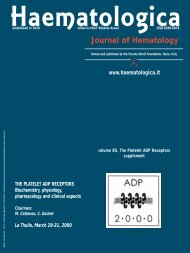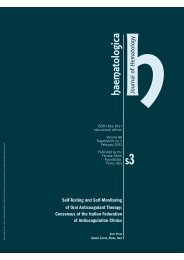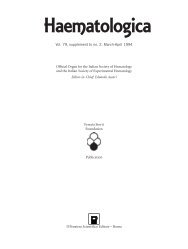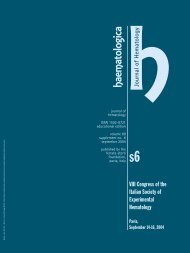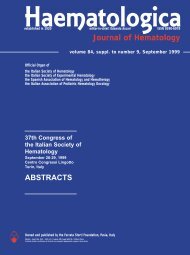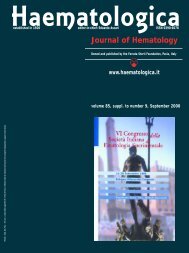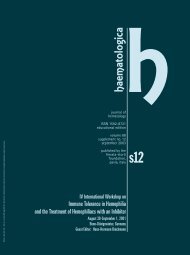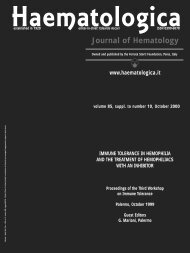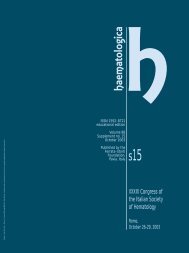Haematologica 2003 - Supplements
Haematologica 2003 - Supplements
Haematologica 2003 - Supplements
You also want an ePaper? Increase the reach of your titles
YUMPU automatically turns print PDFs into web optimized ePapers that Google loves.
decreased after 96h (pre:0.12%,post:0.07%), when CD25+ γδT<br />
cells levels were higher. We did not find significative differences<br />
in this study between the different groups, although this could be<br />
due to the small size of the subgroups. Conclusions: MM and PD<br />
have the same percentage of γδ T cells, but the activation was<br />
higher in MM. After pamidronate, the induction was rapid in<br />
MM: after 72h, MM did not show any increase in CD69+, but<br />
higher levels of CD25+. Stimulation was delayed in PD, with<br />
higher levels of CD69+ but no increase in CD25+. These results<br />
show that pamidronate stimulate γδT cells in MM and PD, but<br />
further studies are needed to assess this antitumor role.<br />
068<br />
T-cells rendered to express chimeric immunoreceptors<br />
targeting B-cell antigens lyse multiple myeloma cells<br />
Max S. Topp, Horst-Dieter Hummel, Christina Neff,<br />
Gabriele Kuntz, Laurence J.N. Cooper, Michael C. Jensen,<br />
Hermann Einsele<br />
Department of Hematology and Oncology, Universität<br />
Tübingen,Tübingen,GermanyPediatric Hematology-Oncology, City<br />
of Hope National Medical Center, USA<br />
There is increasing evidence that multiple myeloma patients may also<br />
harbour circulating multiple myeloma progenitors, which express<br />
early/intermediated B-cell antigens such as CD19 and CD20 but lack<br />
expression of the plasma cell antigen CD138. Transplantation of<br />
purified CD19+ PBMC form multiple myeloma patients into<br />
irradiated NOD/SCID mice results in multiple myeloma engraftment<br />
(Pilarski et. al; Exp Hematol. 2002.; Matsui et al, ASH 2002).<br />
Furthermore multiple myeloma progenitors cells are also<br />
characterized by over-expression of the multi drug resistance gene<br />
and may therefore be resistance to standard high dose chemotherapy<br />
followed autologous stem cell transplantation.<br />
Thus novel treatment strategies targeting such multiple myeloma<br />
cells effectively are highly warranted.<br />
An attractive approach of combing the dynamic properties of<br />
cytolytic potential of T-cells with the development of high affinity<br />
specific for B-cell antigens is the construction and expression of<br />
chimeric immunoreceptors in T-cells. This was accomplished by the<br />
genetic modification of CTL to express a chimeric immunoreceptor<br />
composed of either the CD19 or the CD20-specific single-chain<br />
immunoglobulin extra cellular targeting domain fused to a CD3-ζ<br />
intracellular signalling domain. CD19- and CD20-specific CD8+ T-<br />
cells clones were established through limiting dilution and the<br />
surfaces expression of chimeric immunoreceptors determined by<br />
flow-cytometry with an anti-Fc polyclonal antibody. T-cell clones<br />
with the highest expression were then used as effectors in standard<br />
Cr-release assays with the CD19+ multiple myeloma cell lines<br />
CD19+ ARH-77 and HS-Sultan and as a control the CML cell line<br />
CD19- K562. Both the CD19 and CD20-specific CD8+ T-cell clones<br />
could specifically lyse the MM cell lines ARH-77 and HS-Sultan (up<br />
to 65% at E/T of 1:1) whereas the CD19- targets where not<br />
recognized. Lysis was abrogated by preincubation of targets with<br />
anti-MHC-I antibody, demonstrating the MHC-I independent<br />
recognition of the targets. Similarly T-cells stimulated with the either<br />
MM cell line ARH-77 or HS-Sultan readily produced IFN-γ (ELISA)<br />
whereas incubation with the CD19- cell lines K562 no IFN-γ<br />
production was detected in collected supernatants.<br />
In summary, construction and expression of either CD19 or<br />
CD20-specific chimeric immunoreceptors in CD8+ T-cells results<br />
in specific recognition of CD19+ multiple myeloma cells. These<br />
pre-clinical observation helps justify further investigation in to<br />
the potential of this novel concept in preventing the engraftment<br />
of multiple myeloma in NOD/SCID mice.<br />
069<br />
Myeloma Infiltrating Lymphocytes (MILS) as a Strategy<br />
for Enhancing Adoptive Immunotherapy<br />
Kimberly A. Noonan, William Matsui, Hyam I. Levitsky, Ivan<br />
Borrello<br />
Sidney Kimmel Comprehensive Cancer Center at Johns Hopkins,<br />
Baltimore, MD 21231<br />
T cell mediated immune responses can mediate a tumor-specific<br />
response in the appropriate setting. Unfortunately, the severe<br />
defects underlying immune responses in cancer-bearing hosts<br />
limit the efficacy of adoptive T cell transfer from such hosts. Exvivo<br />
activation of T cells with beads conjugated to CD3 and<br />
CD28 antibodies has been capable of activating and augmenting<br />
peripheral T cells in a non-specific polyclonal manner from<br />
cancer-bearing hosts. However, a major concern is the absence<br />
of tumor-specificity of this approach.<br />
T cells can be obtained from the tumor micro-environment with a<br />
heightened tumor specificity as compared to peripheral blood. In<br />
comparing T cells obtained from these two different<br />
compartments, we have demonstrated oligoclonal restriction of<br />
myeloma infiltrating lymphocytes (MILS) obtained from marrow<br />
aspirates. Utilizing the anti-CD3/CD28 conjugated beads, the<br />
MILS showed a greater expansion and an enhanced response to<br />
or plasma cells compared to peripheral blood lymphocytes, in<br />
several assays, suggestive of the activation of a memory/effector<br />
response with heightened tumor specificity.<br />
This strategy provides the ability to enhance the efficacy of<br />
adoptive immunotherapy through the selective isolation and<br />
expansion of tumor-specific cell populations with a greater<br />
antigenic specificity compared to tumor antigen stimulated cells.<br />
The ability to infuse these polyclonal myeloma specific T cells<br />
and ultimately integrate the adoptive transfer of these cells with<br />
myeloma-specific vaccinations are the goals of the clinical<br />
implementation of such an approach.<br />
070<br />
Ex Vivo Activation and Expansion of T Cells from the<br />
Peripheral Blood of Multiple Myeloma Patients Using<br />
the XcellerateTM Process<br />
Vescio, Robert(1); Berenson, James(1); Vij, Ravi(2);<br />
DiPersio, John(2); Borrello, Ivan(3); Rowley, Scott(4);<br />
Siegel, David(4); Martin, Thomas(5); Rasmussen,<br />
Angela(6); Kalamasz, Dale(6); Roehrs, Heather(6);<br />
Markham, Eric(6); Green, Cherie(6); Berenson, Ronald(6);<br />
Bonyhadi, Mark(6); Frohlich, Mark(6)<br />
1)Cedars Sinai Medical Center, Los Angeles, CA; 2)Washington<br />
University, St. Louis, MO; 3)Johns Hopkins University, Baltimore,<br />
MD; 4)Hackensack University, Hackensack, NJ; 5)University of<br />
California, San Francisco, CA; 6)Xcyte Therapies, Inc., Seattle, WA<br />
Previous studies in multiple myeloma have demonstrated a<br />
significant association between survival and baseline levels of T<br />
cells prior to chemotherapy (Kay et al., Blood 2001) as well as<br />
lymphocyte recovery to >500/mm3 fifteen days following<br />
autologous transplantation (Porrata et al., Blood 2001).<br />
Therefore, infusion of large numbers of T cells post transplant<br />
may improve clinical results.<br />
We have developed the XcellerateTM Process for the ex vivo<br />
activation and expansion of T cells using immobilized anti-CD3<br />
and anti-CD28 antibodies covalently linked to magnetic beads<br />
(Dynabeads® M-450 CD3/CD28 T). Adding the beads to<br />
peripheral blood mononuclear cell cultures results in the rapid coligation<br />
of the T cell receptor/CD3 complexes and CD28<br />
S118



